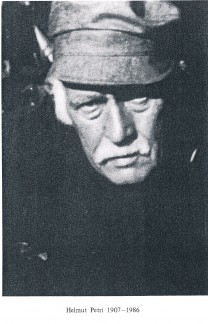Helmut Petri was born in Cologne in 1907. He attended school both in Berlin and in his hometown.
In 1928 Petri took up his studies. Not only Economics, History and Philosophy were among his subjects but also Prehistory and Physical Anthropology. During the following years Petri studied not only in Berlin and Rome but also in Vienna. Wilhelm Schmidt, Wilhelm Koppers and Robert von Heine-Geldern were among his teachers there. Petri also developed an interest in ancient mexican cultures and learned Aztec.
In 1933 Petri completed his Ph D thesis on the types of money in the South Pacific Region. Moreover, he began to do research trips in the early 1930s, which led him to countries like Greece and Turkey.
After finishing his studies Petri worked as a curator at the Museum of Ethnology and the Museum of Natural History in Vienna. In 1935 he took up an assistant position at the Institute of Cultural Morphology (now: Frobenius-Institute) in Frankfurt/Main.
Furthermore, Petri began to work at the Department for Australia and Oceania at the Frankfurt Museum for the Cultures of the World. In 1938/39 Petri did his first field research in Australia, where he collected ethnographic material among several Aboriginal groups in the Kimberley region. Through this experience Petri developed a strong interest in the method of field work.
During World War II Petri had to join the German Army and eventually became a prisoner of war. Being disbanded in 1946 he returned to Frankfurt and took up his assistant position at the Frobenius-Institute again. He also kept working at the Museum for the Cultures of the World and began lecturing on Anthropology.
He participated at the first meeting of German anthropologists after WW II (Frankfurt/Main, 19.-21.09.1946).
In 1949 Petri completed his habilitation thesis on australian shamanism. During the following years he was not only lecturing and working at the museum but also evaluated the data collected during his first field research. In 1953/54 he did a second research trip to Australia, accompanied by his wife. After his return to Frankfurt Petri took up a professorship for Anthropology in 1956.
In 1958 Petri became head chairman of the Department of Social and Cultural Anthropology at the University in Cologne. Besides lecturing Petri did research on several world regions including Mexico, North America, Oceania and the Mediterranean. Moreover, he regularly organized field researches with his students in countries like Greece, Ireland or Spain.
Petri retired in 1973 but continuously returned to Australia, where he conducted field work abbot the cultural change among the Aboriginals.
Wolfgang Petri died after a car accident in 1986.
* 7.11.1907 in Köln + 21.6.1986 in Köln
(Text written by Vincenz Kokot in February 2012, based on an obituary by Michels, Thomas, 1988, Paideuma, ed. 34; photo source: Paideuma 1988, Vol 34)


